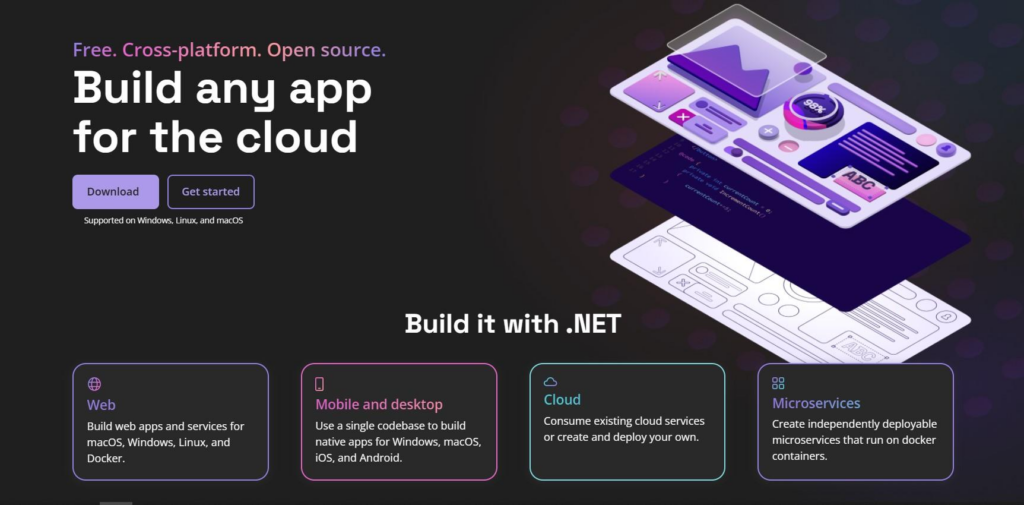Despite the increased popularity of JavaScript frameworks and Python, .NET remains the preferred programming language for many organizations, especially those using Microsoft services such as Windows and Azure cloud. This means .NET developers are still in demand and are among the best paid in the industry, according to estimates from Salary.com and PayScale.
.NET has been consistently listed as the top non-JavaScript software development framework in the last five iterations of the Stack Overflow Developer Survey. Unsurprisingly, most professional developers on Windows prefer to learn how to build and deploy modern technologies such as microservices and containerization using .NET instead of the more popular JavaScript frameworks.
In this post, we discuss the .NET developer job market in detail. We’ll cover essential topics such as the availability of talent and geographical distribution of .NET developers, .NET developer skills for today’s software development demands, and what you need to do to attract and retain the best .NET development talent.
Is It Hard to Find .NET Developers?
Unlike in the past, professional .NET developers are fewer and harder to recruit and retain today. Some of the challenges making it harder to find and recruit top .NET developers in the current job market include:
– .NET Development Is Now A Niche Job Market
In the last few years, .NET developers have become more niche, serving a particular segment of the software development market. Any professional .NET developer you find today is likely doing it in a professional capacity and with experience. This unique characteristic of the .NET developer marketplace makes a bit harder to find professional developers than JavaScript developers.
Take, for instance, ASP.NET software development in the current job market. New developers have been gravitating towards popular JavaScript web development frameworks in the past few years. This has left the ASP.NET market to highly skilled and experienced senior developers who can handle the slightly steeper learning curve for ASP.NET and fit into new development teams.
With the laws of demand and supply in play, employers increasingly have to look harder into the smaller pool of mostly senior developers to find professional .NET developers. Generally, the current .NET developer talent pool is limited compared to other technology stacks.
– Geographical Distribution of .NET Developers
Most .NET developers are concentrated in the top software development markets- USA, India, and the United Kingdom where there is a lot of talent competition. According to industry statistics, the majority of .NET developers are in the United States (45.7%), followed by India (9.9%) and the United Kingdom (6.2%). This means employers from other regions have to spend more to attract top .NET developer talent as these developers have little incentive to relocate.
Using offshore software development services is a remedy for this challenge that has steadily gained traction in recent years. Some countries with shortages in .NET developer talent are turning to offshore developer industries in places like India, Latin America, and Africa. Offshore .NET development, in a way, is bridging the gap in the market currently, as these markets generally tend to develop demand talent.
– Job Lock Among Experienced .NET Developers
Any experienced .NET developer today has probably worked the same job for the better part of their professional life and is therefore locked to their job. Microsoft’s .NET development technology stack is arguably designed to lock developers in, making it harder for developers to switch roles and employers because they are so invested in their projects and roles.
On average, most senior or highly trained .NET developers work as in-house .NET developers or in established .NET software development firms where they build and maintain large systems. For instance, the US government is one of the biggest employers of top .NET developers as it relies on Microsoft technologies in various agencies. Many of these developers are not willing to switch jobs or employers because they are so attached to their current roles for the long term.
On top of all this, .NET applications are designed to be tightly coupled, meaning that changes to the application’s code require significant time and effort to implement. This means most software development companies or those employing in-house .NET developers are keen on retaining their existing developers to avoid dealing with system maintenance challenges.
– Fewer Job Opportunities
Arguably, there are fewer job opportunities for experienced .NET developers, meaning most new developers prefer more in-demand technologies like JavaScript. Popular JavaScript development frameworks like Node.js, Angular, and React have overtaken ASP.NET, which currently accounts for just 20.7% of the developer market, according to the 2022 Stack Overflow Developer Survey.
Fewer job opportunities for .NET developers would naturally mean finding unemployed developers is easier. However, the availability of labor in the software development industry has a shorter cycle because of how fast development technologies change or evolve. If there are fewer job opportunities in a target technology stack, labor availability shrinks because new developers use more in-demand technologies.
– .NET Software development Has a High Entry Barrier
Arguably, it is harder for junior developers, fresh graduates, or self-taught software developers to find jobs as .NET developers as the entry barrier or entry requirements are so high. The enterprise-focused software development technology generally attracts companies or individuals looking to develop or upgrade complex systems and critical business software, which explains the stricter job requirements.
Because the bar is usually set so high, you may find it much harder to find unemployed or available .NET developers who have the skills and are willing to take on your project or can deliver. Generally, junior .NET developers are scarce or usually absorbed into established software development firms where they work under experienced senior developers. Of course, companies can address this challenge by investing in training for junior .NET developers or outsourcing to offshore software development companies.
Are .NET Developers in Demand?
Despite the challenges companies looking to hire experienced .NET developers face, the demand for developers has remained steady over the years because .NET is one of the more established software development platforms, especially for enterprise customers. .NET is still the second most popular business software development technology after JavaScript frameworks to date.
Some of the reasons why .NET Developers are in demand today include the following:
C# Is Very Popular and Stable
C# is the primary programming language inside dotNET. It is still one of the most popular languages in the market, with millions of developers relying on it to develop scalable applications across platforms. C# is one of the older languages that Microsoft has steadily maintained and promoted through dotNET. It is stable, easy to use, secure, and compatible with popular programming languages like JavaScript and c++.
.NET is the Preferred Windows Development Technology

While you can use most of the popular software development technologies to build applications for windows platforms, .NET remains the native technology preferred by many. For Windows systems, .NET provides a wide array of libraries and tools and better integration with old and modern Windows and windows-based systems. For this reason, there is a healthy demand for .NET developers worldwide because Windows remains the most business OS platform.
Fewer .NET Developers in the market
Connected to the previous points regarding the challenges of finding .NET developers, fewer experienced .NET developers in the market mean demand is high because of competition among employers. Many companies still rely on .NET to develop scalable business applications and maintain existing legacy systems but are increasingly having to compete for a shrinking .NET developer market.
Some of the ways companies can address talent scarcity in the .NET job market are to expand their search offshore, invest in training and hire remote developers. A significant percentage of developers in developed markets are tied to their current jobs or are too expensive for most employers, especially small businesses. Training junior developers or hiring remote offshore .NET development teams is the only viable option for such employers.
Multi-Platform Support
Unlike older versions of the .NET software development framework, recent technologies such as .NET Core and NET 7 support multi-platform and cross-platform software development and deployment. This has dramatically expanded the market for solutions developed with .NET and increased demand for developers who understand how to use these new .NET technologies. The growth and improvement of .NET will continue pushing demand for talent higher as the use of JavaScript frameworks plateaus.
Demand for Azure Cloud Development Developers
Azure, Microsoft’s cloud platform, is the second in terms of demand behind Amazon’s AWS. With many Microsoft customers moving to the cloud, there is a growing need for experienced .NET developers to help with the transition. These developers are essential in helping companies make the most of Azure and ensure their applications are as good as their desktop alternatives.
Demand for Enterprise-Ready Web Applications
ASP.NET is a clear leader in enterprise web application development, focusing on scalability and security using technologies like microservices and containerization. More and more companies are looking for experienced .NET developers to help them develop web applications that can be used on multiple devices and platforms and are highly scalable. Experienced .NET developers have the skills and knowledge to develop robust and secure web applications that handle large amounts of data and users.
.NET Is A Development Ecosystem on Its Own
Unlike other popular software development technologies like Python, which are primarily specialized or decentralized (many variations and vendors), .NET is a whole software development ecosystem. Every technology stack you need to develop applications of all types and for all platforms and architectures is available under .NET. From ASP. You can do everything with NET, from web applications to mobile applications, microservices to games, and OS utilities to industrial firmware.
There is always a demand for .NET skills in multiple industries. A .NET developer does not have to rely on a single industry for jobs if they possess the basic skills to develop solutions inside the massive .NET development ecosystem. However, a drawback of this characteristic for the .NET job market is that companies looking for specific .NET development skills often attract many generalists or developers with no experience in the specific industry they are targeting. For instance, a job post for .NET firmware developers may attract .NET web developers who must undergo training to perform in their new roles if hired.
Legacy Systems Maintenance and Porting
Because Microsoft Windows was the dominant business platform for many years, many legacy systems developed in the last two decades were developed with .NET. Legacy systems are old (mostly enterprise) systems developed over ten years ago that still fulfill the purposes for which they were created. Many organizations still rely on these legacy systems for the smooth running of their businesses. They are reluctant to upgrade to newer solutions for various reasons.
Since most old Windows developers either went into retirement or changed careers, companies and government institutions still relying on legacy systems are always hiring .NET developers. They help these entities maintain and secure these old systems by developing new utilities and patches continuously.
Are .NET Developers Well Paid?
Yes, .NET developers are among the best-paid software developers in the industry because of demand and the average skill level required to land a job. For instance, Salary.com estimates the average .NET software developer salary in California between $91,000 to $113,000 per year. Developers in other states, such as New York, earn higher salaries, and those in offshore locations like India earn equally competitive salaries.
Most .NET developers are generally full-time employees working as in-house developers in large organizations, software development firms, or freelance developers who work remotely for companies in developed countries. To save on costs, companies generally prefer to hire offshore .NET development companies on a contract basis and pay a fixed rate for the entire project.
Which Is Better Java Or .NET In Future?
Java and .NET are very powerful software development technologies widely used across industries. They’ve both been around for a while and have grown in terms of features, ease of use, and userbase. We would say that the choice between them depends on your needs, available software development talent, and the requirements of your project.
There is no indication that either of these software development technologies will gain an edge over the other as they each have a good following and are actively supported. However, .NET seems to be more favored for cloud development, making it a future-proof technology, given the shift toward cloud computing.
What Is the Average Salary for A .NET Developer?

The average salary for a .NET developer is $95,000 per year, according to data from different career websites such as Salary.com and Glassdoor. Generally, .NET developer salaries range between $32,000 to $145,000 per year, depending on the location experience, employer, and other factors. For instance, location plays a significant role in .NET developer salaries, with developers in developed countries such as the United States attracting higher wages than their counterparts in less-developed countries.
What Are the Benefits of Hiring A .NET Developer?
Hiring an experienced .NET developer over buying off-the-shelf software or SaaS products has many advantages, among them:
Customized .NET Software development– a .NET developer will create software solutions customized to your specific needs and intended use. They’ll be able to analyze your problem, document it, develop a custom design, and implement the solution by developing a custom .NET application for you.
Ongoing Support– Anyone who has dealt with large software vendors and SaaS providers knows the pain of getting support when there is a problem. Hiring your own .NET developer means they will be readily available even after you start using the solution to solve issues, provide updates and answer your questions.
Privacy-You can sign a non-disclosure agreement with a .NET developer to ensure they don’t reveal the details of the .NET software solution they create for you. This can be good for businesses that deal with sensitive data or those that prefer to keep their information guarded for various reasons.
Cost – In most cases, it is usually cheaper to develop your own software if the problem you are trying to solve is very specific and small, as opposed to customizing large third-party vendor solutions. For instance, most businesses hire .NET developers to create software that integrates with existing ERPs using an API to facilitate specific transactions. Hiring someone to do this is usually cheaper than modifying the ERP.
There are many other reasons to hire .NET developers, such as security, accountability, more control over feature development, intellectual property protection, the possibility of reselling developed solutions, etc. However, not all problems or companies need to hire dedicated .NET developers. Sometimes it may be better to purchase an off-the-shelf solution or outsource to an offshore or onshore software development company.
What Skills Do .NET Developers Need?

Generally, a good .NET developer should have experience developing software using .NET technologies on any platform. The specific skills depend on the project and framework they will be developing with inside .NET, but they may include:
Programming with C#- A deep understanding of the C# programming language is essential as it is the primary language used in .NET.
Knowledge of .NET- .NET developers should be familiar with the workings of the .NET software development technology stack, including the different frameworks and how they are used, libraries, the Common Language Runtime (CLR), Nuget package management, functions, Just In Time Compiler, deployment methods, etc.
Object-oriented programming- An essential requirement for all .NET developers is a thorough understanding of object-oriented programming, as .NET uses OOP patterns. They must be familiar with OOP concepts like classes, objects, encapsulation, functions, etc.
Database Query Languages and Databases- Databases are heavily used in .NET software development, so .NET developers need to know how to work with databases in a programming environment. When hiring, consider if the .NET developer is adept at the specific database technology you will use in your applications, such as MS SQL, MYSQL, PostgreSQL, etc.
Depending on the project you are hiring them for, they may need to be familiar with technologies such as HTML, CSS, Docker, servers, etc.
Are .NET Developers Full Stack?
Not all .NET developers are full stack as there are both front-end and backed frameworks inside .NET. Some may be front-end developers creating interfaces using .NET frameworks such as Blazor and razor pages, while others can do back-end development with C#. However, many .NET developers understand the entire technology stack and do full-stack development.
How Much Does It Cost to Hire A .Net Dev Team?
The cost to hire a .NET development team mainly depends on various factors, such as the team size, experience, and expertise, the complexity of the .NET project, and the team’s location. Generally, a .Net development team can cost anywhere from $30 to $300 an hour, with offshore and nearshore teams being cheaper and onshore or in-house teams.
Which Is High Paying Front End or Back-end .NET Developer?
Generally, Front end .NET developers tend to command higher salaries than back-end .NET developers. However, it depends on the nature of the project and experience level. According to Comparably, the average median salary for Front End .NET Developers is $70,839 per year, while Back End .NET Developers have a median salary of $69,000 per year.
Is .NET Harder Than Node?
Node is a JavaScript runtime environment that generally has a smoother learning curve for those familiar with JavaScript. However, both technologies have their own quirks and advantages for learners, like Node.js’s event-driven architecture and callback functions to handle asynchronous operations. In general, .NET may be seen as more complex to learn than Node because it is so massive and uses the stricter C# language.
Is Python Good For .NET Developers?
You don’t need to use Python to develop applications inside .NET. However, it is an excellent language to learn if you are interested in developing machine learning and data science applications for other projects. C# is the primary programming language in .NET, although there is support for other languages, including Python.
Questions to Ask Before Hiring .Net Developers
Questions About the Project
Here are some of the questions you can ask yourself before hiring .NET developers for any project:
- What tools, libraries, and frameworks will I need for this .NET project?
- How much time is a realistic estimate for completing this project?
- What challenges should I expect to encounter in this project?
- What development processes should I use for this project?
- How will I ensure that the project meets the necessary security standards?
- What metrics should I track as I work on this project?
- Are there any existing tools or services that can streamline the development process of this project?
Questions to Ask .NET Developers Before Hiring
- What experience do you have developing with the .NET framework?
- Do you have experience developing back-end web applications using ASP.NET?
- Are you familiar with the most recent version of the .NET framework?
- How much experience do you have with object-oriented programming?
- Are you comfortable developing web services and APIs?
- What experience do you have with web security and authentication methods?
- Do you have experience with database technologies like SQL Server or MySQL?
- Are you comfortable working with source control systems such as Git or Subversion?
- Do you have experience with cloud-based development platforms such as Azure?
- Are you familiar with design patterns such as MVC and MVP?
Examples of Net Developer Jobs
- .NET Full Stack Developer
- .NET Back-end Developer
- .NET Microservices Developer
- .NET Database Developer
- .NET UI Developer
- .NET UX Developer
- .NET Web Application Developer
- .NET Mobile Application Developer
- .NET Desktop Application Developer
- .NET Cloud Application Developer
- .NET Web Services Developer
Conclusion
All in all, .NET development will remain among the most in-demand skills in the industry as more and more businesses look to develop modern, scalable, and distributed business solutions. The continued growth of .NET alternatives is an opportunity, rather than a threat, for experienced developers as they’ll be able to command better rates and find it easier to get high-paying jobs. Offshore development is the way to go for businesses looking to reduce .NET software development costs.



